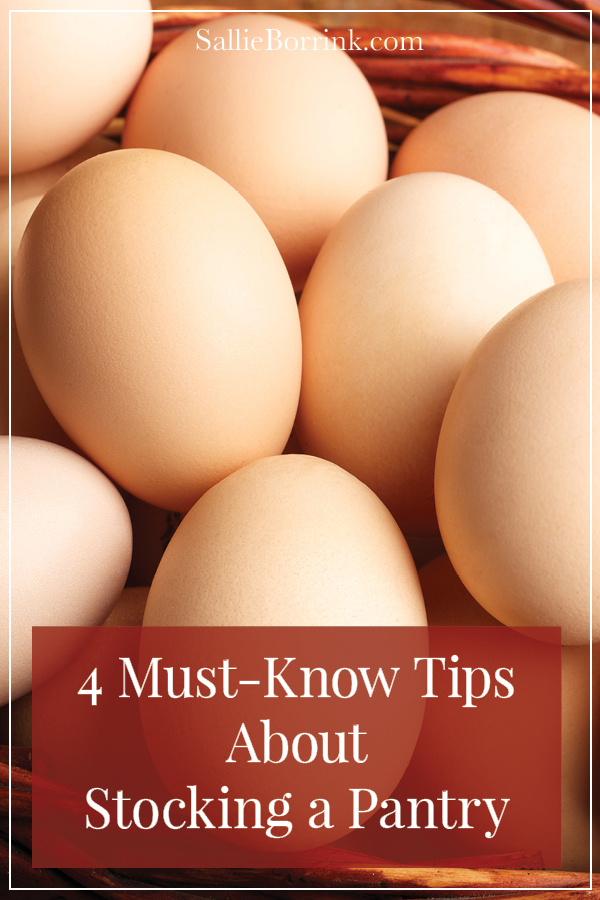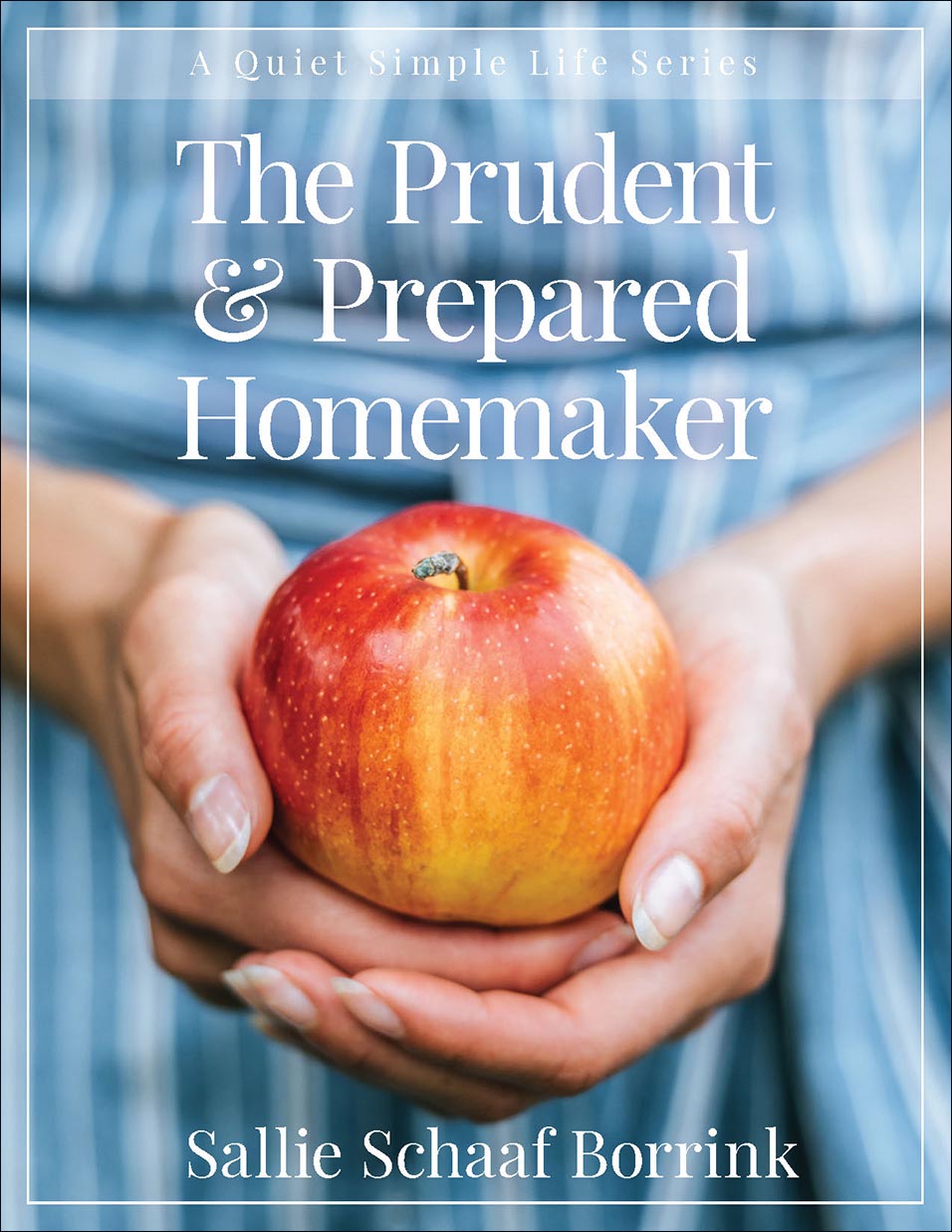We recently read Farmer Boy aloud with Caroline. Have you ever noticed how a significant portion of books like this revolve around food? Throughout the entire book, the Wilder family is planting it, caring for it, protecting it, harvesting it, storing it, selling it, and buying it. Creating and stocking a pantry is a central part of their existence. Why? Because food is a foundation of daily life and people were largely responsible for feeding themselves at that time.
By contrast, we as a culture have been lulled to sleep when it comes to food to the point where most women no longer create or stock a pantry of any kind. We assume any food we want will be available whenever we want it. Not only do we assume the basics like flour, sugar, salt, and such will be available, we now also assume that gluten free, allergen free, BPA free food will be available all the time. But what if it wasn’t?
In this post, I’m will share four must-know tips to think about while stocking your own home pantry.
Throughout the post I will be referring to items in The Prudent and Prepared Homemaker. This is important resource is available in my shop.
Tip 1: You Need More Food Than You Think
The main goal in developing a pantry and preparing for uncertainties is to have everything you need for an extended period of time. Most people, however, don’t realize how much they would need if they only ate at home day after day for a number of days or even weeks. It’s so common to eat on the go and stop for quick items at the grocery store that we don’t really know how much food we go through on a weekly and monthly basis.
By way of example, let’s consider eggs.
You might think to yourself, “We don’t really eat that many eggs so I don’t keep many around.” But is that true? And would it be true in a difficult situation?
Let’s say you are stuck at home for whatever reason. What might you do? Bake comfort foods.
What does baking generally need? Eggs.
So do things like pancakes and meatballs and all sorts of other comfort foods. Eggs are also a relatively inexpensive, easy, and nutritious food. So while you originally thought you really don’t eat that many eggs, you might realize that you would go through quite a few quickly.
Now carry that through to other staples such as flour, butter, oil, etc.

Tip 2: Do You Really Know What You Eat?
Before you can build up an effective pantry that meets your particular needs, you need to know what you actually do eat in your home. My suggestion is that you write down everything that is consumed by the members of your household for one week. Be as accurate as possible. The What Do You Really Eat? worksheets will give you a place to record this. Once you complete this step, you’ll be ready to do more with your pantry building.
If you want to dig deep, you can make the decision to only eat at home for one week with what is in the house right now – no additional shopping or outside food purchases – and see how quickly your supplies diminish. It was eye-opening when we had an extended period of time at home a number of years ago to see how much food we really went through when there was no other option available to us.
Tip 3: Complete a One Week Food Plan
After you’ve completed the What Do You Really Eat? worksheets, you are ready to move on to the next step.
Next up is the One Week Food Plan. This will help you analyze in detail what you learned as you tracked the eating patterns in your household for one week.
After you complete the One Week Food Plan, you’ll have a better and more informed understanding of what preparing your pantry should look like in your particular situation.
Tip 4: Create a Master Pantry List
While you are keeping track of what you eat in your home, you can begin to prepare your existing pantry. The Master Pantry List will be a valuable tool to refer to as you begin to think about ways you can stock your own pantry in the coming days. It contains a comprehensive list of the most commonly used foods and ingredients in American homes. There is also a place to add additional needs unique to your home.
I recommend you print a reference copy to keep in your binder. You can also print extra copies to use for brainstorming and checklists.

Your First Pantry Step – Clean It Out
Before you can begin stocking your pantry in a way that works for you, you need to clean out what you already have. So your first pantry task is to go through all of your food and get rid of everything that needs to go. This includes food that:
- no one likes
- is past dated
- is stale
- you regret buying, but won’t eat
- you can’t identify
- you don’t remember buying so you don’t know if it is still good
- you have no idea where it came from
- is “too good to throw away” even though it won’t be eaten
Don’t get sidetracked with organizing or feeling guilty about throwing food away. Simply go through every place you have food and clean it out. This includes:
- refrigerator
- cupboards
- deep freeze
- extra refrigerator
- basement
- pantry
- garage
- under the bed
- closets
- drawers
Once you’ve gotten rid of everything that you can’t or won’t eat, celebrate! You’ll be ready to move on to other tasks.
As you realize there are things you legitimately need to replace as you are cleaning out your pantry, start a list in your notebook. You can use the Notes, Lists & Records pages.
Next up I’ll share three important pantry tips with you!
The Prudent & Prepared Homemaker
Read All of the Posts in the Series
3 Reasons To Become A Prudent & Prepared Homemaker
5 Reasons To Keep Written Pantry & Emergency Notes
4 Must-Know Tips About Stocking a Pantry
3 Tips for Building Your Pantry
7 Places To Find Extra Money For Stocking Your Pantry
3 Reasons Most “First Things to Buy” Prepper Lists Are Worthless
4 Tips to Deal with Emergency Anxiety
4 Facts About Preparing For Emergencies
3 Unusual Tips For Emergency Preparedness
11 Ways To Prepare Your Home For A Storm
4 Important Tips About Safe Water
4 Types of People Who Should Buy a 14-Day Emergency Food Supply Pack









 5 Reasons To Keep Written Pantry & Emergency Notes
5 Reasons To Keep Written Pantry & Emergency Notes
At the start of the pandemic I went through 3 dozen eggs and 3 pounds of butter as I made cookies for everyone we knew and delivered them.
Isn’t it amazing how quickly you go through some ingredients when you are forced to do all of your own cooking or do more cooking out of boredom?
Many to most people spend so much of their time away from home that they had no idea how much they would need of certain things when they were home all the time.
Sallie